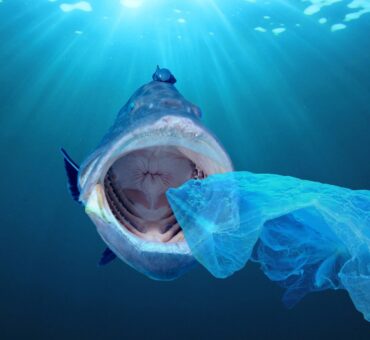It’s ubiquitous—found in the deepest recesses of the Mariana Trench, the bellies of fish, the air we breathe, and our blood. Plastic pollution in all its forms is a mounting global concern, but it appears to have taken a backseat during the COVID-19 pandemic.
Plastic production worldwide has quadrupled in the past four decades, according to a 2019 study. Adding to this somber statistic, the COVID-19 crisis has prompted an increase in the production of plastic products like surgical masks and gloves, face shields, and protective equipment. While this heightened production is, of course, important for protecting human health, the additional plastic will eventually end up somewhere – in a landfill, incinerated, or in oceans around the world.
Concerns about plastic have been seemingly pushed aside during the crisis. From the careless disposal of plastic gloves and masks in cities around the world to aggressive plastic and petroleum industry lobbying, and the rollback or cancellation of regulations on the use of single-use plastic, the COVID-19 health crisis has posed a series of challenges for reducing plastic pollution worldwide.
Increasing Ocean Pollution
Every year, 8 million metric tons of plastics enter our oceans on top of the estimated 150 million metric tons that currently circulate in our marine environments. Scientists predict that there will be one pound of plastic in the ocean for every three pounds of fish by 2025 and more plastic trash in the ocean than fish by 2050. And according to several studies, discarded personal protective equipment (PPE) is particularly hazardous for marine life since gloves and plastic bags can be mistaken for jellyfish or other food sources, while the straps on masks can present entangling hazards.
Furthermore, due to concerns over viral spread, recycling and municipal waste services in the US and worldwide have been significantly limited during the pandemic, making it highly unlikely that the extra plastic we’re using to protect ourselves today will be recycled.
Pre-Pandemic Progress
In March, the European Union voted to ban single-use plastics by 2021. In June, Canada followed suit, promising to also hold plastics manufacturers responsible for their waste. One hundred and forty-one countries, including China, Bangladesh, India, and 34 African countries, have implemented taxes or partial bans on plastics.
Meanwhile, in the US the Trump administration has worked against many of these efforts to reduce plastic waste, so cities and towns have led the charge independently. As of today eight states have enacted plastic restrictions and municipal governments have passed more than 330 local plastic bag ordinances in 24 states.
Fears Feed Rollbacks
On April 22nd, amid concerns about spreading the Coronavirus, California Governor Newsom signed an executive order that suspends the state’s voter-approved single-use plastic bag ban for 60 days. Many California grocery stores have discouraged people from bringing reusable bags due to concerns about contamination. However, at this time there’s no scientific evidence that a reusable item is more likely to spread COVID-19 than a single-use plastic item. Unfortunately, the plastic industry is exploiting fears and spreading misinformation while pushing for rollbacks of plastic bag bans across the country.
As restaurants begin to re-open throughout California for dine-in service, the plastics industry continues to exploit fear and misinformation by encouraging consumers to utilize single-use, disposable plastic cutlery as opposed to reusable silverware. From production to packaging and shipping, disposable items pass through a countless number of hands by the time they reach a restaurant. According to the experts, the most hygienic food-ware for your meals is the kind that can go through a dishwasher.
What You Can Do
Reuse Your Bags – Channelkeeper encourages people to continue using their reusable bags safely and to follow individual store policies. While some local grocers have asked customers not to use reusable shopping bags for the time being, many are still allowing their use provided that customers bag their own groceries and do not place reusable bags on the counter. Another alternative is to load groceries back into the cart, take the cart out to your car, and place your groceries into your reusable bags at the car. If you choose to use reusable bags when going shopping for food and essential goods, it’s wise to wash them by hand or launder in hot water and soap.
Conduct a Beach Clean-up – Get fresh air while making a difference in your community. Check out our Beach Clean-up Guide for tips on how to conduct a clean-up and contribute to Channelkeeper’s database of trash collected from local beaches.
Bring Your Own Reusable Cutlery – In an effort to keep yourself and restaurant employees safe while reducing your plastic footprint, consider bringing your own your own reusable cutlery to use when dining in. Just be sure to let restaurant employees know that you will not need disposable plastic cutlery with your order. You can even make your own utensil carrying case to keep your silverware clean and secure in your bag so you always have them handy.

